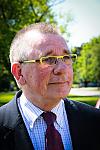European Migration Agenda unrealistic
European Migration Agenda unrealistic
 The European Commission today presented the new European Migration Agenda. The SP’s European Parliament group is unimpressed, as group chair Dennis de Jong explains.
The European Commission today presented the new European Migration Agenda. The SP’s European Parliament group is unimpressed, as group chair Dennis de Jong explains.
‘Just beyond the EU’s external frontiers the world is in flames. Every day, people have to be rescued from the Mediterranean Sea. The Commission is still using for this task border guard services whose personnel are specially trained to keep people out. The Commission has, moreover, produced no solution to the problems refugees, and this European Migration Agenda (EMA) is once again contradictory: restrictive when it comes to people in need, and an open immigration policy for the well-educated. This will only increase the number of migrants heading towards Europe.´
The SP favours a comprehensive plan in which the United Nations High Commission for Refugees (UNHCR) plays a key role. Instability in the Middle East and North Africa is now so great that it would be an illusion to expect that the stream of refugees from those regions will lessen. ´Refugee camps within the affected region leave a great deal to be desired, with neither security nor logistics properly organised. The UNHCR estimates that 130,000 of the most vulnerable refugees need urgently rehousing because they can’t hold out any longer in the camps. The Commission has offered the UNHCR merely dribs and drabs here and there. The EU’s aim should be, however, the reinforcement of regional facilities and in addition, to receive in Europe primarily the most vulnerable. This could even mean transferring less vulnerable refugees arriving in Europe over to the UNHCR, and housing them back in the region.’
The relocation of large fresh streams of refugees to other EU member states could certainly relieve some of the pressure on countries such as Italy and Greece, but the question is whether the member states can ever agree on an approach which isn’t voluntary. ‘I read in the EMA that the number of inhabitants of a member state counts for 40% of the criteria,’ says De Jong. ‘The greater the population, the more asylum seekers can, according to the Commission, be accommodated. Population density, however, doesn’t get taken into account, while it obviously matters to your capacity to deal with refugees whether you have a densely- or thinly-populated country.’
The SP rejects the proposal for easing migration policy in the case of the well-educated. ‘For years we’ve been drawing attention to the fact that attracting well-educated people from the developing world leads to a brain drain which is extremely undesirable for those countries,’ De Jong recalls. ‘As well, this part of the EMA makes the whole thing exceptionally contradictory. In developing countries potential migrants on one side will hear that they are very welcome, provided they have a high standard of education, while at the same time information schemes are being established to let the less well-educated know that they should drop any plans they may have to move to Europe. That’s never going to work.’
